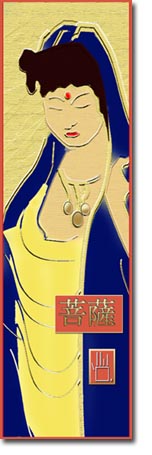On The Way: The Daily Zen Journal
Sho-do-ka – Song of Realization
Yoka-daishi (d.713) with commentary by Nyogen Senzaki
The minute you attain Buddha’s Zen,
The six noble deeds and the ten thousand good actions
Are already complete within you.
In your dream there are six paths,
But when you awake, they will be reduced to nothingness.
Buddha’s Zen was transmitted first to Mahakasyapa from heart to heart. There is no record in the Sutras about this inner teaching, but one whose meditation is mature receives the same genealogical wisdom. For this reason, Zen lives vividly through human experiences, transcending all scripture and sectarian doctrines.
No sin, no happiness, no loss and no gain.
Do not try to seek these things in Mind-Essence.
For a long time you have not wiped the dust from your mirror.
Now is the time for you to see its brilliance precisely.
Your Mind-Essence is bright from the very beginning This is the day to see it clearly. This is the moment to begin your work.
Who thinks non-thinking and who recognizes non-existence? It if is really non-existence, you cannot think of it.
Ask a robot whether it is happy or not.
As long as you aim to become Buddha,
No matter how you strive, you will never be one.

Do these stanzas seem difficult? Remember that Zen can be realized but never explained. In your meditation you may already have experienced non-thinking.
Do not cling to the four elements.
Drink and eat according to your true nature.
Things are transient, therefore,
They are in a state of emptiness.
This is Buddha’s realization.
Do not think of good or bad with your mind and body. Forget that you have a mind and body. Make the present moment the only true life you have. If an idea disturbs you, think of the impermanence of worldly things.
When the illusions of individual entity vanish, the gate of true meditation will open. With empty hands and an empty mind you can meet your true self.
Who said there exists Buddha’s realization? Do not be cheated by Yoka-daishi or anyone else. Find out for yourself.
Yoka-daishi (d.713)
Commentary Nyogen Senzaki (1876-1958)
Excerpted from Buddhism and Zen Edited by Nyogen Senzaki and Ruth McCandless 1953




The Sho-do-ka is often translated as the Song of Realization, and this older translation from 1953 is wonderful in that in the text there is commentary from Senzaki’s own instruction to his students.
The Sho-do-ka is memorized in its entirely by students in China, Korea, and Japan, and they are often inspired during its recitation. There are newer translations that can be found, but there is something exquisite about the reading of this older translation.
As with many of the longer pieces, it is better broken down into smaller reflections to allow us closer to the heart of the teaching.
Walking the path with you,
Elana, Scribe for Daily Zen